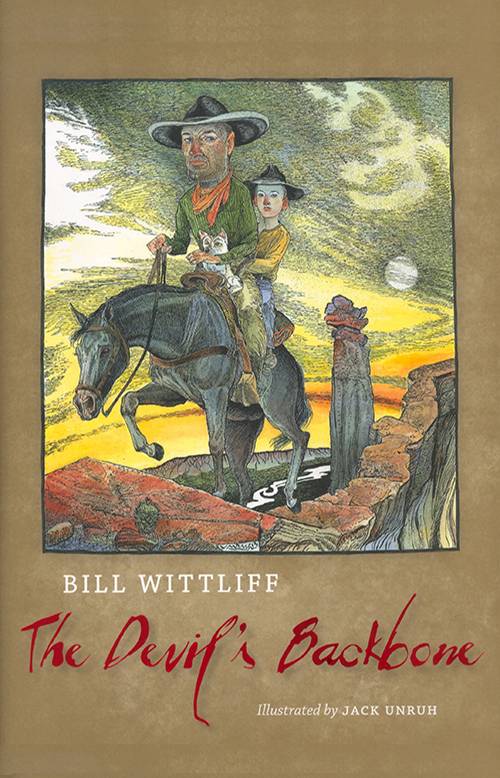
The Devil’s Backbone
by Bill Wittliff
Austin: University of Texas Press, 2014
224 pp. $29.95 cloth
Reviewed by
Lawton Cook
"Wittliff’s wildly imaginative cast and plot, combined with Unruh’s stark sense of image, The Devil’s Backbone makes for the best kind of old-fashioned Texas tale, and the remaining books in the series are sure to impress."
With an established film career, Bill Wittliff now looks ready to tackle the literature world with his debut novel. The Devil's Backbone is in the tradition of tall tales told around a campfire on a starry Texas night. This is especially true of the narrator's unmistakable Texas dialect, and although it can be disorienting at times, the experience of reading the book mimics that of listening to the gruff voice of some retired cowboy. Wittliff's choice to write in short, untitled sections as opposed to chapters gives the feel of natural pauses and tonal sways that one might encounter in an oral telling, and unnatural plot twists that some readers may find fault with come off as the best examples of embellishment by a seasoned storyteller. Along with Jack Unruh's delightfully quirky illustrations, Wittliff's world comes to life in ways that are sure to be remembered.
The novel, first in a series called The Papa Stories, opens with the narrator, Papa, as he leaves the family farm in search of his mother who has fled the abusive relationship with her husband and Papa’s father, Old Karl. From there we are born into the 1880s Texas of Wittliff’s imagination, following Papa into the dangers of the Old West. The story follows Papa to familiar Texas Hill Country towns such as New Braunfels and Kandalia, and even dips as far south as the Rio Grande. We are introduced to a bizarre array of unforgettable characters, including a dog named Fritz that laughs but is unable to track and a cowboy named Calley Pearsall who shapes out to be Papa’s best ally on his journey to find his mother.
Wittliff’s wildly imaginative cast and plot, combined with Unruh’s stark sense of image, The Devil’s Backbone makes for the best kind of old-fashioned Texas tale, and the remaining books in the series are sure to impress.
All praise aside, Wittliff’s book does employ a few narrative techniques that some modern readers may find trouble with. While it has been hailed as the new Adventures of Huckleberry Finn for their similarities in voice and plot structure, The Devil's Backbone also utilizes a few coincidental plot turns that readers may find more satisfying in Twain than they do in modern fiction. As well, the characters all seem to lie on one side of good and evil without much of the complexity a reader might expect.
These stylings only sharpen Wittliff’s idea of story. The epigraph to the novel, a quote by Texas folklorist J. Frank Dobie, reads “Never let facts get in the way of truth.” In that way, The Devil’s Backbone marks a triumph for Bill Wittliff. It's obvious that he is more concerned with telling a story that is a pleasure to read, giving his readers a multitude of surprises they won't find elsewhere. This book is not to be critically analyzed and argued over, nor is it meant to serve some greater political purpose. Bill Wittliff's book is meant for readers looking to have fun with a book, and when they pick up The Devil's Backbone, they will find it challenging to put down.
Lawton Cook is the Editorial Fellow at the Center for the Study of the Southwest. He is working on a novel.
